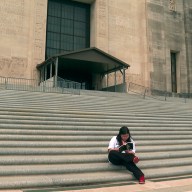 In “Is the Man Who is Tall Happy?,” director Michel Gondry fits a chat with Noam Chomsky with hand-drawn animation.
In “Is the Man Who is Tall Happy?,” director Michel Gondry fits a chat with Noam Chomsky with hand-drawn animation.
Credit: Sundance Selects
‘Is the Man Who is Tall Happy?’
Director: Michel Gondry
Features: Noam Chomsky, Michel Gondry
Rating: NR
3 (out of 5) Globes
French filmmaker and music video craftsman Michel Gondry (“Eternal Sunshine of the Spotless Mind,” etc.”) is not the obvious choice to chat with Noam Chomsky. But it’s that outside the box thinking that makes him, at least in this case, ideal. For the least decade, the linguist/philosopher/logician/activist has been known primarily for his political commentary. But he can articulate upon any topic. Gondry, by contrast, is not a man of any strong political stripe, but he is someone who, despite his penchant for whimsy, finds inspiration by challenging himself. “Dave Chappelle’s Block Party” found him in another country, making his first documentary. Here he’s talking to someone he openly admits his infinitely his intellectual superior.
Conversationally, “Is the Man Who is Tall Happy?” does not offer a balance between the two stars, but Gondry makes himself known in two key ways: by the specific routes in which he steers the conversations, and through visuals. Gondry is largely interested in Chomsky’s knowledge of science, specifically cognitive science. “Nature is simple and it’s up to the scientist to show that it’s simple,” Chomsky intones, in his usual soft yet guttural drone. “If you find irreducible complexity, you don’t understand it.”
Gondry’s own interest is widespread. He directs Chomsky towards “the mechanism of inspiration,” and how creativity and is tied to language. The director has worked in America for years, but his command of the English language is still wanting. But that can be a good thing, as confusion can lead to genuine invention. In response, Chomsky talks about how true scientific discovery starts with treating the presumed-to-be obvious (say, why objects fall to the ground, in the age of Isaac Newton) with sudden skepticism.
A filmmaker like Gondry would never settle for talking heads, or even speaking over dinner or walking around, as in other chat-a-thons like “My Dinner With Andre,” “Mindwalk” and the series that began with “Before Sunrise.” He doodles on the screen, in animations hand-drawn on paper and filmed, old school, one frame at a time. Sometimes the images illustrate or simplify what’s being said; other times they’re mere stream-of-consciousness eye candy. By design they’re not there to overwhelm what’s being said — and they don’t. They’re there largely to be charming and to ensure we’re stimulated visually as well as intellectually.
Perhaps inevitably, Gondry tries to humanize Chomsky by asking him personal questions that no one would think to ask a man of his stature. His first question is in the film is “What is your first memory?” Later he tries, and fails, to get Chomsky to talk about his late wife, but does get him to talk about what makes him happy at 83, which tends to be much more adorably mundane than you’d expect from Noam Chomsky. The man himself remains elusive, but he’s just open enough that he remains appropriately mysterious.
















